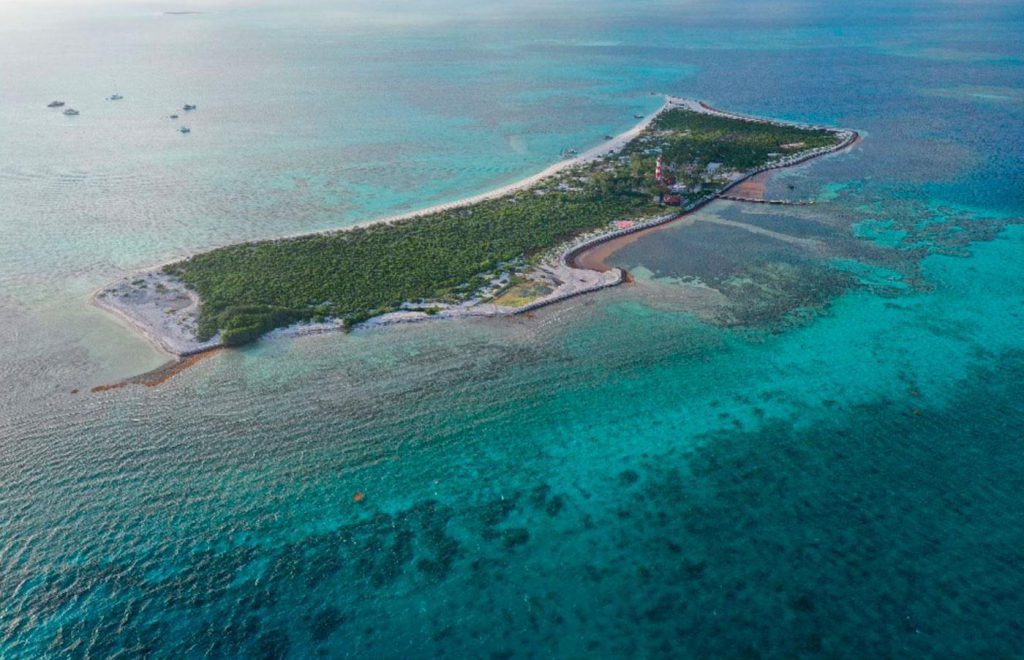Content
Discover the mighty Scorpion Reef National Park (in Spanish: Parque Nacional Arrecife Alacranes), one of Mexico’s most cherished submarine and terrestrial protected areas. With its diversity of marine life and captivating coral formations, we invite you to immerse yourself in a world of adventure and awe.
Introduction
Historical Overview of Scorpion Reef National Park
Declared as a National Park on June 6, 1994, Scorpion Reef is the largest coral structure in the Gulf of Mexico. This natural wonder, covering 333,768.51 hectares, has been designated a Biosphere Reserve by UNESCO and is home to an astonishing diversity of marine species. It is listed in the RAMSAR Convention on Wetlands (2008) and as a MaB Biosphere Reserve (2006).
Location and How to Get There
Located 140 kilometers north of the city of Mérida, in the Yucatán state opposite the municipality of Progreso, Scorpion Reef is accessible by boat from the ports of Progreso and Yucalpetén. The journey usually takes around three hours, but the natural spectacle that awaits you is definitely worth it.
General Description
Ecology and Biodiversity
The park harbors an incredible variety of marine species, including turtles, rays, and over 200 species of fish. You can also find several species of seabirds nesting here, making it a paradise for nature and wildlife enthusiasts.
Geography and Geological Features
Scorpion Reef National Park comprises five islands and several coral reefs. The coral reef, which is the largest in the Gulf of Mexico, plays a crucial role in the marine ecosystem of the region and serves as a spectacular backdrop for diving and snorkeling.
Tourist Activities
Snorkeling and Diving
The clarity of the water and the rich biodiversity make Scorpion Reef National Park an ideal destination for snorkeling and diving. Both beginners and experienced divers can explore the beauty of this wonderful underwater ecosystem.
Wildlife Observation
With its diverse fauna, the park is an excellent spot for wildlife observation. From seabirds to turtles, lionfish… Wildlife observation here is a truly unforgettable experience.
Importance of Conservation
Threats and Challenges
Scorpion Reef faces various challenges, including climate change and overfishing. Raising awareness and acting responsibly are essential to preserve this valuable ecosystem for future generations.
Conservation Projects and Their Impact
Several conservation projects are underway to preserve the park’s rich biodiversity. These efforts not only protect the species that inhabit the park but also contribute to the overall health of our oceans.
Importance of Environmental Education
Environmental education is crucial to ensure the conservation of Scorpion Reef National Park. Visitors are encouraged to learn about the importance of marine conservation and how they can contribute to it.
Preparing for Your Visit
Best Time to Visit
The best time to visit Scorpion Reef National Park is from March to September when the weather is most suitable for water activities and wildlife observation.
Regulations and Tips for Visitors
Visitors must respect all park regulations to protect the ecosystem. This includes not touching or disturbing animals and avoiding the use of chemical sunscreens that can harm coral reefs.
Facilities and Accommodation in the Area
While there’s no accommodation directly on the islands, visitors can find a variety of options in the nearby areas of Progreso and Mérida. Basic facilities exist on the main island, Isla Pérez, including a lighthouse and a small chapel.
Highlighted Experiences in Scorpion Reef
Isla Pérez and Its Historic Lighthouse
Isla Pérez is the heart of Scorpion Reef National Park and hosts a historic lighthouse that is an island landmark. A walk to the lighthouse offers a stunning panoramic view of the reef and its surroundings.
Encounters with Marine Fauna
Encounters with marine life are a highlight of any visit. The opportunity to swim alongside turtles, observe brightly colored fish, and, if you’re lucky, spot dolphins, is a truly magical experience.
The Reef Diving Experience
Diving in Scorpion Reef National Park is unparalleled. The chance to explore this vibrant underwater ecosystem and its coral formations is an experience that will leave you breathless.
